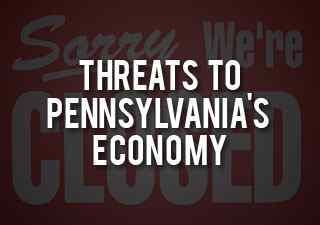Commentary

Five Threats to Pennsylvania’s Prosperity
Unfortunately, our plight could soon be getting worse, as five landmark policy proposals threaten Pennsylvania’s prosperity.
Public Pensions: Beginning in 2012-13, taxpayers will see a dramatic increase in their contributions to pension plans for state and school district employees. This scenario is due in large part to misguided policy decisions-including substantial increases in pension benefits in 2001 and 2002, and deferring increased payments following fund losses-as well as the recent downturn in the stock market. Pension contributions are estimated to rise by $1,360 per homeowner/household, resulting in higher property and state taxes. Additionally, local pension plans are facing major deficits. House Bill 1828, which was signed into law by Gov. Rendell in September, makes matters worse by allowing Philadelphia to contribute less to its public pension fund temporarily, shifting the burden to future generations.
Alternative Energy Mandates: By 2021, Pennsylvania utilities must generate 18% of their electricity from alternative sources. House Bill 80, which passed the state House Environmental Resources and Energy Committee, would increase this percentage by 83%. These mandates will make electricity more expensive for Pennsylvanians. The Pennsylvania Utilities Commission estimates that solar and wind energy are 700% and 23% more expensive than coal, respectively. Energy suppliers will inevitably pass these additional costs on to consumers. A modest estimate predicts H.B. 80 will increase Pennsylvania utility bills by $8 billion to $9 billion (approximately $1,600-$1,800 per household).
National Health Care: Pending federal health care legislation would further drain Pennsylvanians’ wallets and savings accounts. Leading bills before Congress would mandate “community rating” and “guaranteed issue,” both of which drive up health insurance premiums. After New York passed community rating (which forces insurers to impose uniform rates regardless of an insured’s age, health status or behavior) and guaranteed issue (which forces insurers to sell coverage to everyone), premiums increased by 40%. Today, New York’s health insurance rates are among the highest in the nation. The proposed legislation would add $4,400 to the cost of health care for every man, woman, and child in Pennsylvania and reduce the state’s economic growth 5.1% by 2019. The Medicaid expansion alone is expected to require an additional $1.5 billion in Pennsylvania state spending.
Cap and Trade: Another federal proposal that would have a significantly negative impact on Pennsylvanians is Cap and Trade. The U.S. House has already approved the Waxman-Markey bill (H.R. 2454). Because Pennsylvania is the 4th largest coal-producing state, Cap and Trade would be a major detriment to the state economy. The Heritage Foundation estimated Pennsylvania would lose 46,762 jobs between 2012 and 2035, and electricity costs would increase $608 per household. The PUC estimated the average Pennsylvanian’s electricity bill would increase over $400 annually.
Tolling I-80: Finally, the Pennsylvania Turnpike Commission’s (PTC) proposal to toll Interstate-80 would harm Pennsylvanians financially and should once again be rejected. The PTC proposal does not comply with federal programs, as toll revenue would be redistributed to other road projects and mass transit in Philadelphia and Pittsburgh. The plan equates to a tax on I-80 drivers to fund inefficient and poorly managed mass transits agencies. The effects of this scheme would be devastating for the communities in the I-80 corridor.
To make Pennsylvania competitive economically, we must overhaul the pension system, starting with enrolling new public employees in a unified, defined-contribution plan. The state should allow the alternative energy market to develop independent of mandates. Pennsylvania needs to restructure Medicaid by converting it to vouchers for low income individuals. Proposals like Cap and Trade, which would undermine the Keystone State’s economy, must be defeated. And rather than tolling I-80 or raising taxes to fund transportation, state lawmakers should look to control spending, repeal costly prevailing wage laws, and competitively bid management of mass transit.
# # #
Katrina Anderson is a Research Fellow with the Commonwealth Foundation (www.CommonwealthFoundation.org), a public policy education and research institute located in Harrisburg.